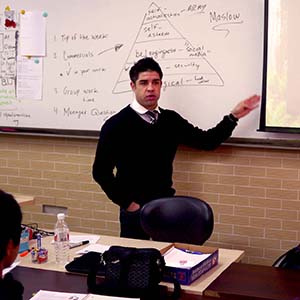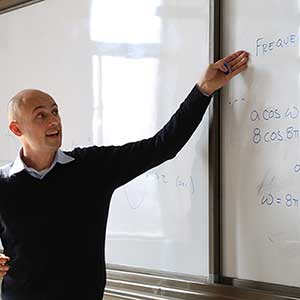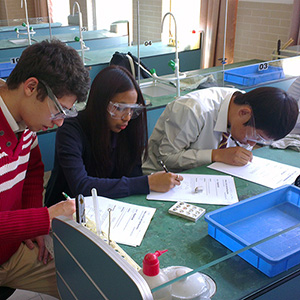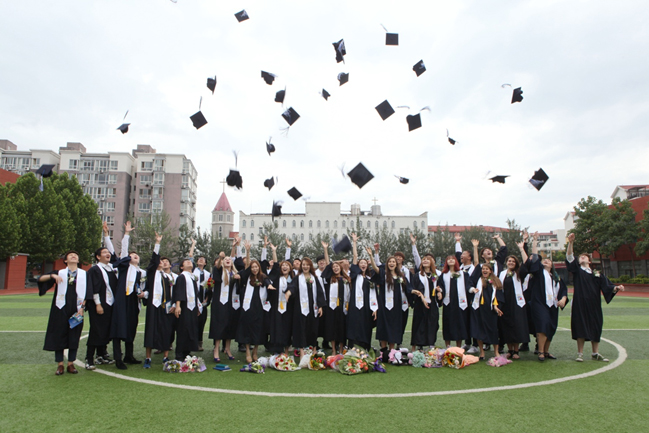St. Paul Educational Consulting and Services
Academics
Curricular Goals
-
Overall goal of the Daechi Saint Paul Academy program is to provide students with an authentic American curriculum within an American educational environment. It will also acclimatize students to the teaching methods and practices of American teachers while practicing English skills within academic content areas through immersion in the American curriculum.
Courses
The regular US High School Curriculum (English Language Arts, Math, Social Studies, Science, Technology and Electives) will be taught by 'certified' American teachers. Art, Music, Physical Education/Health will be covered by 'qualified' teachers. From the 3rd year of the school, the STEM curriculum offers AP Science, Math, Engineering, Robotics and Computer Programming for the STEM track diploma.

The overarching goal of the English department is to prepare students to be successful at the college level by providing them with a comprehensive understanding of the English language. At all grade levels, reading, writing, speaking, and analytical thinking will be emphasized and assessed. We believe these skills will help strengthen students’ ability to interpret the world around them. During their English studies at Saint Paul American School, students begin by mastering the foundations of English composition, and progressively move to a variety of specific writing, speaking, and literature courses. Students will analyze and respond to a wide range of literary texts that encompass a global perspective, with an emphasis on highly energetic, discussion-based learning experiences. Along with the core English curriculum, each student must also enroll in at least one Speech course. The purpose of this requirement is aimed at helping students build confidence, refine verbal and nonverbal communication skills, and, ultimately, be able to successfully deliver a wide variety of practical speeches. Students are also encouraged to engage in programs like Student Newsletter, Yearbook, and Creative Writing contests. These extracurricular pursuits provide students the opportunity to experiment with their writing skills and deepen their understanding in unique settings. Ultimately, we hope to instill in our students a love of literature, as well as the confidence to communicate effectively.
- General English 9 (year-long) - Prerequisites: none - Grade Level: 9
- Honors General English 9 (year-long) - Prerequisites:Successful honors application - Grade Level: 9
- General English 10 (year-long) - Prerequisites: none - Grade Level: 10
- Honors General English 10 (year-long) - Prerequisites: Successful honors application - Grade Level: 10
- American Literature (year-long) - Prerequisites: Academic Writing - Grade Level: 11-12
- World Literature (year-long) - Prerequisites: none - Grade Level: 11-12
- Creative Writing (1-semester long) - Prerequisites: none - Grade Level: 11-12
- Speech (1-semester long) - Prerequisites: none - Grade Level: 12
- AP Literature and Composition (year-long) - Prerequisites: Lexile score of 1100 and successful honors application - Grade Level: 11-12

Courses in the Math department follow as much as possible a traditional American progression of high-school Mathematics classes. These start in Algebra I and continue through college-level Calculus. Emphasis is placed on graphing, functions, and critical thinking. Higher level classes require a high level of English because of the types of questions asked. Students are placed during their first term at Saint Paul American School in the class that best reflects their current Math level with consideration given to English ability. Students who finish our Math program will not only be ready for college courses, but will also be problem-solvers in many aspects of their lives; including finance, statistics, and applied sciences.
- Geometry (year-long) - Prerequisites: none - Grade Level: 9
- Algebra 1 (year-long) - Prerequisites:Successful honors application - Grade Level: 10
- Algebra 2 (year-long) - Prerequisites:Algebra 1 and Geometry - Grade Level: 11/12
- Pre-calculus (year-long) - Prerequisites: Algebra 2 or equivalent material - Grade Level: 11/12
- Calculus (year-long) - Prerequisites: ---------TBD------------- - Grade Level: 12
- AP Calculus (year-long) - Prerequisites: Four years of secondary mathematics covering algebra, geometry, trigonometry, analytic geometry, and elementary functions - Grade Level:12
- AP Statistics (year-long) - Prerequisites: Algebra 2 or equivalent material or special permission - Grade Level: 12
The Social Studies Department at St. Paul American School offers Government, History, Geography, and Economics classes that seek to prepare students to become educated global citizens. As students progress through their course of study at St. Paul American School, the department hopes that students will be made aware of various cultures and understand how they have developed over time. Students begin with the foundational courses of Geography and American Government. These courses provide a framework for both American and World History, with culminating courses analyzing economic principles that drive current industrial markets. Along with the standard Social Studies curriculum, students also have the opportunity to enroll in Social Studies electives, which include Current Events and Social Issues. These courses allow students to read and discuss real-world news events, case studies, and legal proceedings, thereby furthering their understanding of how the world functions as a global community. Finally, the model UN is a great opportunity for students to come together to collaborate and discuss contemporary world issues. The overarching goal of the department is to provide students with the skill set necessary to help them become informed decision-makers that will them to make a positive impact in the world.
- American Government
(semester--long) - Prerequisites: none - Grade Level: 9
- World Geography
(semester--long) - Prerequisites:None - Grade Level: 9
- US History (year-long) - Prerequisites:None - Grade Level: 10
- World History (year-long) - Prerequisites: None - Grade Level: 11
- Economics
(semester--long) - Prerequisites:None - Grade Level:
The Science department follows a sequential, inquiry-based learning program, dedicated to fostering an appreciation for the essential concepts of scientific thought. At all grade levels of science studies, students learn through a variety of hands-on experiences, including experiments, observations, and discussions regarding foundational scientific concepts. Students are encouraged to learn through the process of discovery, with emphasis on critical thinking and analysis. Students begin with an introductory Physical Science course, covering the basic makeup of the world, from atoms to Newton’s laws. Students then progress to Biology, learning about the basics of anatomy, ecology, and the fundamentals of biochemistry. Chemistry follows, with an emphasis on precision and accuracy in scientific writing. Finally, students culminate their studies with high-level classical and modern Physics. The ultimate goal of the department is to allow students to learn and arrive at their own understanding of the world through exploration. We also hope to equip students with the confidence to utilize the scientific method in various aspects of their examination of the world around them

- Physical Science (year-long) - Prerequisites: none - Grade Level: 9 or 10
- Biology (year-long) - Prerequisites:None - Grade Level: 9 or 10
- Chemistry (year-long) - Prerequisites:Physical Science and Algebra 1 - Grade Level: 11
- Physics (year-long) - Prerequisites: Geometry, Algebra 1, Good knowledge of Trigonometry - Grade Level: 11 or 12
- AP Calculus (year-long) - Prerequisites: Full year of Chemistry and Algebra 2 - Grade Level:12
- AP Biology (year-long) - Prerequisites: Biology and Chemistry (with B+ or better) - Grade Level: 12
• Students will develop a deep conceptual understanding of fundamental concepts in chemistry by responding to written and oral questions challenging students to analyze and explain these concepts.
• Students will use logic and quantitative reasoning skills to solve chemistry problems by interpreting problems and developing models prior to calculating results, in order to assess the validity of results.
• Students will develop proficient laboratory skills by manipulating laboratory equipment, collecting experimental data, evaluating the validity of data, and explaining experimental results using chemical theories.
• Students will develop the ability to think like a scientist by designing experimental procedures and predicting the results of experiments in hypothesis statements.
• Students will express their ideas clearly and logically, both orally and in writing, by writing original laboratory reports and summarizing experimental results in oral presntations.
In order to achieve these goals, this course will emphasize chemical theory, quantitative problem solving, hands-on laboratory experiences, written laboratory reports, and (formal and informal) oral presentations.
We will be covering a wide range of topics including atomic structure and periodicity, ionic and covalent compounds, reactions and equations, stoichiometry, thermochemistry, states of matter, solutions, kinetics, equilibrium, acids and bases, electrochemistry, and organic chemistry. A detailed list of the topics to be covered and course schedule are included later in this syllabus.
Each semester will consist of nine weeks. Students will meet every other day for 85 minutes (on A days) and occasionally will be required to meet for additional 50 minute classes after school (dates will be negotiated with the class).
This class will require students to do extensive college-level reading and to utilize critical thinking skills in a college preparatory, self-motivated environment. Students are expected to work with a high level of integrity and self-direction. Through laboratory activities, lectures, individual and group projects, students will cover a wide spectrum of concepts in biology.
-
The Information Services department provides students with the necessary computer application skills for them to be successful in their study and work in the future. Students have the opportunity to learn both about modern computer technologies, as well as how to utilize this technology to create original works.
During their studies at Saint Paul American School, students will master Microsoft Office applications; photo, audio and video editing applications; and program using web development and database languages. These courses will supply students with the necessary technological skills to hit the ground running in any undergraduate program in IT.
Information Technology is designed to teach students proficient skills in Microsoft Office and Java Script programming. All lessons are project-based and incorporates cross-curricular exercises to teach software skills while reinforcing English, Math, Language Arts, Social Studies, and Science concepts.
Digital Art expands on foundation skills, exposing students to new applications, including Google’s 3-d modeling, Sketch-up, video editing and advanced features of adobe Photoshop.
Multimedia Journalism is a combination of web development and journalism in the digital age. SPAS Student News (SSN) is a student organization connected with the multimedia journalism class. The SSN team is split into to branches, the broadcast team and the magazine team. The broadcast team produces a weekly news program covering a variety of local and nation news while the magazine team creates a monthly print and online news journal.
- Information Technology *
- Digital Art *
- Multimedia Journalism *
- Web Design - Prerequisites: - Grade Level:
- Computer Science Principles *
- AP Computer Science (year-long) - Prerequisites: - Grade Level: 11 or 12
-
By learning and applying the engineering design process, students will be able to identify a problem, analyze it, develop solutions, implement the solutions, and iterate this process for continual improvement, preparing students to enter the engineering program at any university.
- Principles of Engineering *
- Robotics *
- Engineering Capstone *
Textbook
Graduation


St. Paul American School’s graduation requirements are designed to meet American accreditation standards and entry requirements for a wide range of colleges and universities. Students are required to attend eight semesters of high school in ninth through twelfth grades and complete a minimum of 48 semester credits for graduation. These 48 semester credits must also satisfy the specific departmental requirements described below. Students are individually responsible for seeing that they are meeting the requirements necessary for graduation, but an advisor or administrator monitors each student’s records at the start of each school year. Any student who has a question regarding graduation status should contact an advisor or administrator.
St. Paul American School’s diploma requirements are split into 2 types;
College Track Diploma and STEM Track Diploma.
Subject area graduation requirements are as follows:
-
College Track
• English 8 semester credits (including Speech)
• Math 6 semester credits (including Algebra II)
• Social Studies 7 semester credits (including courses in Geography, Government, U.S. & World History, and Economics)
• Science 6 semester credits (including Biology)
• Physical Education 2 semester credits
• Health 1 semester credit
• Fine/Performing Arts 2 semester credits
• Technology 1 semester credit
• Engineering 0 semester credit
• Foreign Language 6 semester credits (4 must be in the same language)
• Elective 9 semester credits (Any credits in the previous categories that exceed the requirements count as elective credits)
-
STEM Track
• English 8 semester credits (including Speech)
• Math 8 semester credits (including Algebra II and Pre-Calculus)
• Social Studies 7 semester credits (including courses in Geography, Government, U.S. & World History, and Economics)
• Science 6 semester credits (including Biology)
• Physical Education 2 semester credits
• Health 1 semester credit
• Fine/Performing Arts 2 semester credits
• Technology 2 semester credit
• Engineering 2 semester credit
• Foreign Language 6 semester credits (4 must be in the same language)
• Elective 4 semester credits (Any credits in the previous categories that exceed the requirements count as elective credits)
